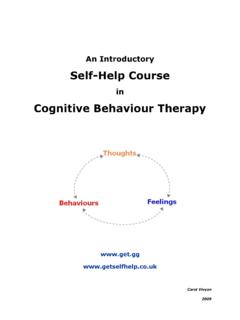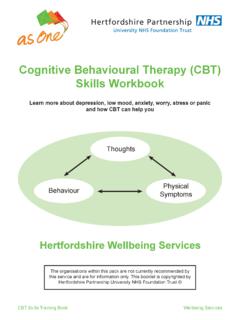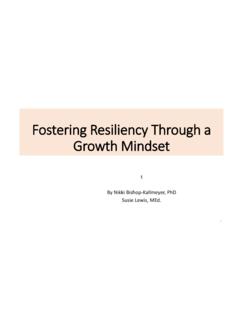Transcription of Addressing Patients’ Emotional and Spiritual Needs
1 Joint Commissionon Quality and SafetyJournalDecember 2003 Volume 29 Number 12659 Addressing patients Emotionaland Spiritual NeedsPatient CenterednessResearchers interest in the connections betweenmind and body1,2coincides with increasing inter-est in the holistic view of health care, in whichemotional and Spiritual Needs are considered inextrica-ble from physical and psychological 10 The Joint Commission on Accreditation of HealthcareOrganizations (JCAHO) has acknowledged that patients psychosocial, Spiritual , and cultural values affect howthey respond to their care 11(p. RI-8)and has addressed spir-ituality and Emotional well-being as aspects of patientcare. For example, Standard refers to pastoralcare and other Spiritual services. (p. RI-15)The intent forStandard , The hospital addresses care at theend of life, (p. RI-13)refers to responding to the psycholog-ical, social, Emotional , Spiritual , and cultural concerns ofthe patient and family.
2 Hospitals have often assigned the responsibility toaddress Emotional and Spiritual issues to chaplains or topastoral teams. Yet others nurses, physicians, clinicians,and other caregivers play equally important roles. The hospital staff s ability to address patients emo-tional and Spiritual Needs factors in to patients percep-tions of the overall experience of care, the provider, andthe organization. For example, as Shelton observed: patients need to feel that their circumstances and feel-ings are appreciated and understood by the health careteam member without criticism or judgment.. Ifpatients feel that the attention they receive is genuine-ly caring and tailored to meet their Needs , it is far morelikely that they will develop trust and confidence in theorganization. 12(p. 63)No comprehensive literature review currently existsto guide hospitalwide management of patients emotionalPaul Alexander Clark, Drain, P.
3 Malone, , :A comprehensive, systematic litera-ture review and original research were conducted toascertain whether patients Emotional and spiritualneeds are important, whether hospitals are effective inaddressing these Needs , and what strategies shouldguide improvement. Methods:The literature review was conducted inAugust 2002. Patient satisfaction data were derived fromthe Press Ganey Associates 2001 National InpatientDatabase; survey data were collected from 1,732,562patients between January 2001 and December 2001. Results:Data analysis revealed a strong relation-ship between the degree to which staff addressedemotional/ Spiritual Needs and overall patient satisfac-tion. Three measures most highly correlated with thismeasure of Emotional / Spiritual care were (1) staffresponse to concerns/complaints, (2) staff effort toinclude patients in decisions about treatment, and (3)staff sensitivity to the inconvenience that health prob-lems and hospitalization can : The Emotional and Spiritual experience of hospitalization remains a prime opportunity for for improvement include the immediateavailability of resources, appropriate referrals to chap-lains or leaders in the religious community, a team dedi-cated to evaluating and improving the Emotional andspiritual care experience, and standardized elicitationand meeting of Emotional and Spiritual Needs .
4 Surveydata suggested a focus on response to concerns/com-plaints, treatment decision making, and staff sensitivity. Article-at-a-Glance660 December 2003 Volume 29 Number 12and Spiritual Needs . This article provides a literaturereview of hospitalized patients Emotional and spiritualneeds and presents survey findings on the importance ofthese Needs in patients perceptions of care. Three ques-tions are addressed:1. Are patients Emotional and Spiritual Needs important? 2. Are hospitals effective in Addressing these Needs ? 3. What strategies should guide improvement in thenear future and long-term? MethodsLiterature ReviewA PUB MED search13produced no systematic literaturereviews on the topic of Addressing patients Emotional , Spiritual , and psychosocial Needs (as of August 18, 2002).Literature identified for inclusion in this review wasobtained through numerous structured searches of PUBMED, EBSCO, ScienceDirect, InterScience, University ofLondon Library, and City University of London Librarydatabases and evaluation of key supporting referencescited within these sources.
5 To be included, literaturereviews or studies had to examine some Emotional orspiritual variable (for example, not exclusively religiousvariables such as attendance at religious services) with-in an acute care setting. Studies entailing both religiousand Spiritual measures were included, but our focus wason the latter. Patient Satisfaction SurveyPatient satisfaction data were derived from the PressGaney Associates national databases. Patient satisfac-tion with the experience of care is assessed through aquestionnaire mailed shortly after a patient s dischargefrom an acute care facility. The survey instrument uses afive-point Likert-type response scale (1 = very poor; 2 =poor; 3 = fair; 4 = good; 5 = very good), which providesreliable (Cronbach alpha score, ) and valid measuresof patient standard survey includes 49questions in 10 separate areas, covering the entirepatient experience from admission to discharge.
6 One ofthese questions addresses the degree to which staffaddressed your Emotional / Spiritual Needs . Analyses uti-lized Press Ganey s 2001 National Inpatient Database,containing data for 1,732,562 patients , collected fromJanuary 2001 to December 2001 and representing 33% ofall hospitals in the United States and 44% of all hospitalswith more than 100 beds. ResultsAre Emotional and Spiritual Needs Important?Patient Perceptions of Emotional and reveals parallels between perceptionsof Emotional and Spiritual Needs . Definitions of spiritu-alityconsistently include the psychological concept of asearch for meaning and 21 For patients who iden-tify Spiritual Needs , those Needs directly involved a rangeof emotions experienced during hospitalization, includ-ing a search for meaning, transcendence, desire to main-tain formal religious practices, alleviating fear andloneliness, and the presence of ,22 26 Emotions and Spiritual Needs also interrelate on aclinical level.
7 Spirituality has been shown to be associat-ed with decreased anxiety and 32 Increaseduse of Spiritual practices among persons with AIDS hasbeen associated with a decrease in psychological dis-tress and depression and an increase in Emotional cop-ing ,34 The Systems of Beliefs Inventory,developed to measure spirituality and religious practicesin medical populations, recognizes the overlapping emo-tional, cognitive, behavioral, and social elements of , emotions and Spiritual Needs areconsistent with patients perceptions of a single selfwhere all Needs notion that caring foremotional and Spiritual Needs employs behaviors andinterventions of a similar nature support, sensitivity,empathy, comfort, affirmation, and attentiveness topatients unique Needs is supported by the literatureand in the data analysis of the survey results. Impact on Health psychologicaland Emotional health damages physical health out-comes.
8 A review of Emotional distress and coronaryheart disease reported that depression, stress, anger, andnegative emotions in general were strongly associatedwith increased cardiac death and reinfarction, indepen-dently of disease example, Pratt et that depression increases the risk of myocar-dial infarction (MI), and Anda et that depres-sion and feelings of hopelessness were associated withincreased mortality from ischemic heart disease. Joint Commissionon Quality and SafetyJournal661 Conversely, Emotional well-being has been shown tobe predictive of survival and functional independenceamong older widely accepted causal rela-tionship between social support and physical health41could be the product of reduction in Emotional a vicious cycle of decline between psychological dis-tress and perceived health, psychological distress wouldlead to increased negative health perceptions, which, inturn, would lead to increased distress and further deteri-oration in perceived outcomes can be positively affected by attemptsto address Emotional and psychosocial Needs .
9 Two studiesnoted positive physiological responses resulting from theemotional comfort of ,45 Through in-depthpatient interviews, Kent et anxiety, depression,and other poor outcomes to be common among patientswith unmet Emotional Needs . Three studies found thatpsychosocial interventions reduced mortality rates amongcancer 49 Appropriate, well-considered respons-es to Emotional distress in cancer patients have beenfound to reduce psychological ,51 Psychosocial interventions benefit patients throughimproved quality of life, Emotional adjustment, function-al adjustment, and psychosocial ,53 Meta-analyses indicate positive clinical effects and decreasedanxiety from preemptive psychological interventionsthat target patients at risk of psychological by Blumenthal et ,55have found that stressmanagement interventions reduce cardiac Emotional distress in patients with coronaryheart disease improves long-term reviews confirm that psychoeducational inter-ventions improve clinical outcomes (for example, anxi-ety, depression, pain)
10 While reducing length of 62 Finally, Spiritual and psychosocial interventions havebeen shown to help patients cope with disease and theeffects of 65In summary, these studies suggest that Emotional andspiritual Needs have a profound effect on patients healthoutcomes and deserve the attention of health care pro-fessionals. Impact on Hospital dis-tress and poor psychological well-being may result inincreased usage of medical hospital-ized for physical illness and later identified as beingdepressed were found to have longer hospital stays, usemore hospital resources, and increase costs by 35%.67 70 Increased usage of medical services by the psychologi-cally distressed has been confirmed in terms of med-ically justifiable visits and illness usage, prima facie, may seem desirable to ahospital s finances, preventable usage strains the overallhealth care system and siphons the attention of a hospi-tal s limited human capital.




![ZÀ]}µ o À }v - TalkPlus](/cache/preview/1/7/c/4/4/b/6/6/thumb-17c44b66edfab6bc2dc10c7f4bbf6249.jpg)



